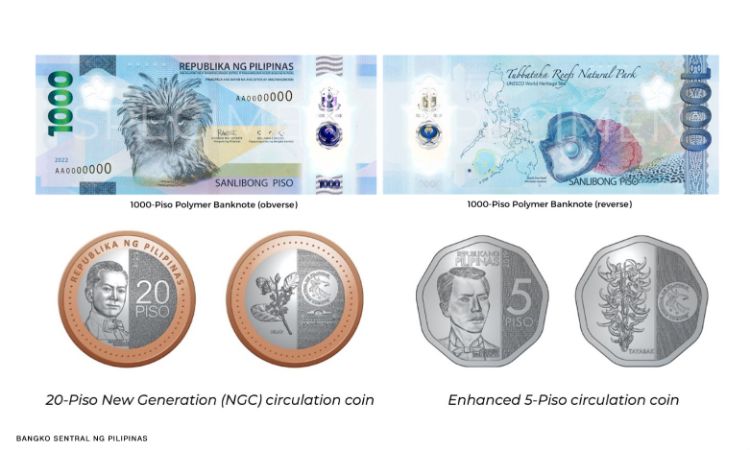The Bangko Sentral ng Pilipinas is releasing soon the initial batch of limited copies of P1,000 and P500 polymer (plastic material) bank notes to be circulated by the banking system.
Amidst the holler against the new polymer (the material used for making plastics) bank notes, the Bangko Sentral ng Pilipinas said it had released initially 10 million pieces, or 0.7 percent, of the estimated combined number of P1,000 paper and polymer banknotes in circulation.
The new money will be released to banks by phases and with a limited quantity this week.
Prior to release, the BSP conducted technical briefings for bank personnel, machine suppliers, and cash-in-transit service providers to educate them on the design and security features of the polymer banknotes.
A total of 500 million pieces of polymer banknotes is expected to be circulated alongside the 1000-Piso paper banknotes by 2023. BSP Governor Benjamin E. Diokno has repeatedly stated that there will be no demonetization of currently circulating banknotes and coins during his term.
Columnist Maribel Ongpin earlier vented her ire on BSP's decision to use polymer(plastic) rather than the tried and tested abaca fiber of the Philippines, which had been proved to be strong, good quality and can withstand pressures of time and being soaked in water.
"The BSP is removing abaca from our currency content and substituting polymer, which is nothing but plastic."
Abaca from banana is the strongest natural fiber in the world prized for its long fiber length and its mechanical strength. It is also resistant to damage by salt water. The world woke up to abaca in the 19th century using it for ships' rigging, ropes, twine, fishing lines and nets, sacks and paper. Manila paper has an abaca base and was used to make strong and sturdy envelopes (Manila envelope). It is now used for clothing, curtains, furnishings and specialty papers. You see these papers in tea and coffee bags, sausage casings, cigarette filter papers, Ongpin said.
It is also used in various forms for medicinal purposes, for food preparation and in the automotive industry. These latter are the modern uses together with erosion control and other environmentally friendly roles. In other words, abaca is a gift of nature to the Philippines which has been historically useful and identifiable with the country. It is a vital part of its economy and has been so for centuries.
So, why is the BSP doing away with abaca in our currency which is one of the most representative items of a country? Is it because other countries are replacing it with polymer in their currency? Are we going to be ignorant copycats in this matter? Does the BSP have no sense of history, or institutional memory of abaca's past and present role in the world economy?
She said the BSP "has become a lemming, rushing unthinkingly, unwittingly and unintelligently into the plastic substitution for abaca. Because abaca is so much a part of the Filipino identity and has a history in our economy, that alone should keep it in our currency even if the world turns to polymer currency."
BSP's lame rationalization is that polymer is cheaper, that it is more recyclable and that it will not deteriorate or cause disease when it becomes dirty after long use.
The BSP's convoluted and repetitive excuse stopped short of saying you could get Covid from our abaca currency if it is dirty. The statement regarding disease from dirty money is pseudoscientific and basically a rationalization of something that lacks any sense, common or educated.
Covid does not come from dirty banknotes as implied and so far, no other disease has been identified as being caused by such. Moreover, if currency notes are dirty or deteriorated, they are replaced as a matter of procedure. One does not have to live with them in that state.
Second, in the process of changing from abaca to polymer, the BSP egregiously removed three heroes from a banknote (the P1,000 bill) and substituted them with the Philippine Eagle, which like abaca is a gift of nature.
But it must certainly have a lower status in the public heart and mind compared to three Filipino human beings who gave their lives for this country in times of crisis — Josefa Llanes Escoda, Justice Jose Abad Santos and Gen. Vicente Lim.
Taking them away from the banknote which was introduced with them is a demotion and diminishment that is unacceptable historically and ethically. Do we place and remove heroes by whimsy or is it ignorance and callousness that we see here? What country banishes heroes from where they have been honored? Who made this decision at the BSP? Who was consulted?
The National Historical Commission has denied it was consulted or had a hand in this sacrilege. Obviously, the BSP proceeded with a serious lack of history or a modicum of nationalism in this move from abaca to polymer, from three authentic heroes to a bird, she said.
Tags: #BSP, #polymerbanknotes, #limitededition, #replacingabaca, #history, #money
